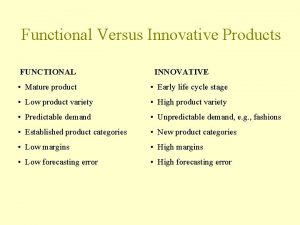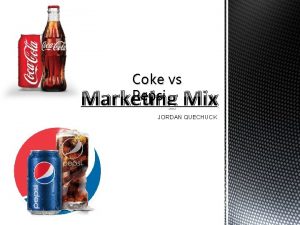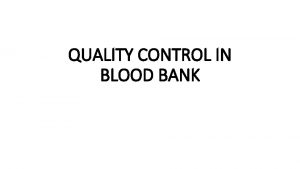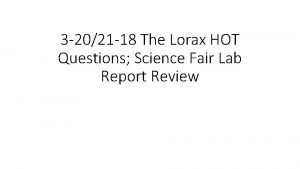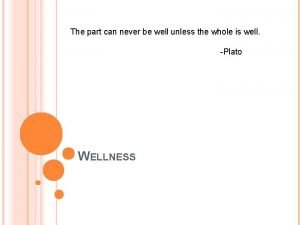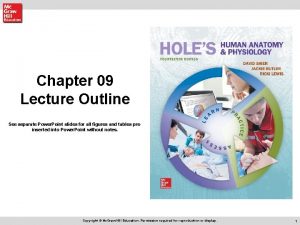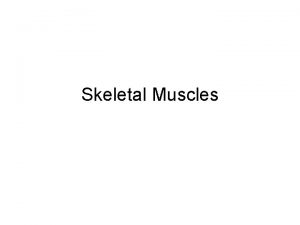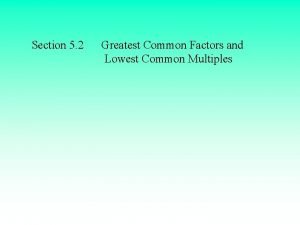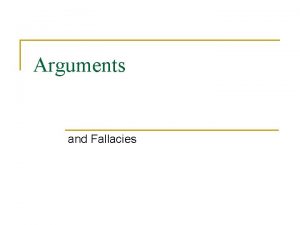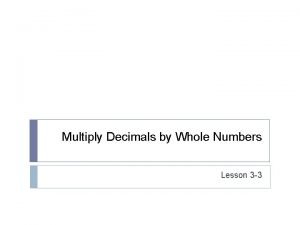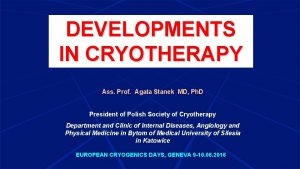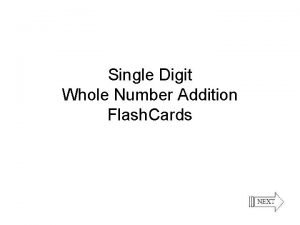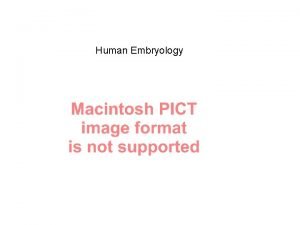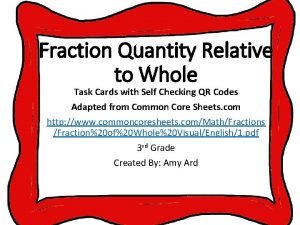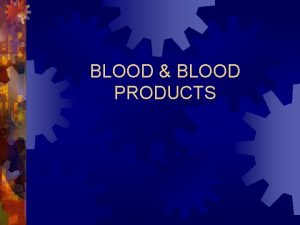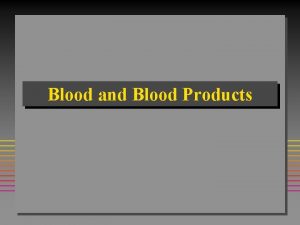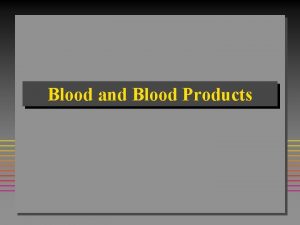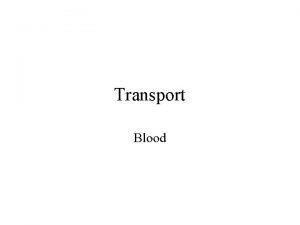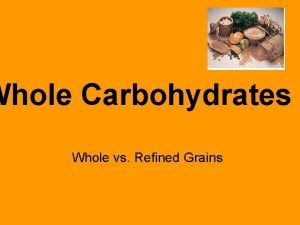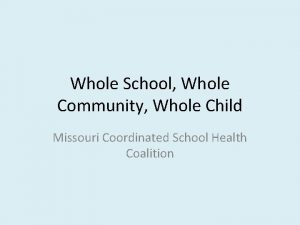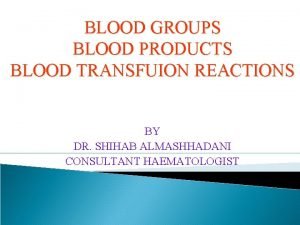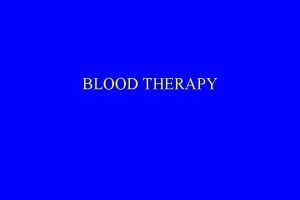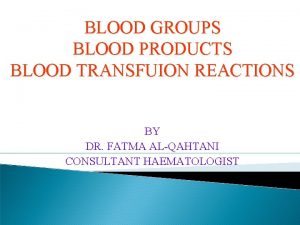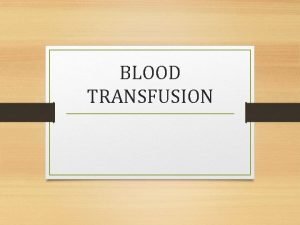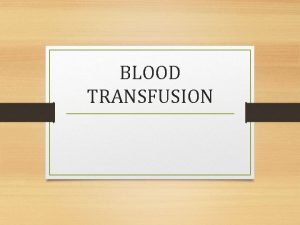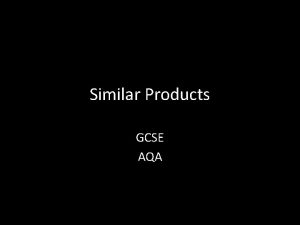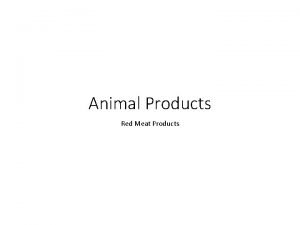BLOOD BLOOD PRODUCTS BLOOD 1 Whole Blood 2

BLOOD & BLOOD PRODUCTS

BLOOD 1. Whole Blood 2. Packed Cell 3. Granulocytes ® BLOOD PRODUCTS 1. F. F. P. 2. Cryoprecipitate 3. Platelete ®

Blood Components Preparation ® Based on different specific gravities ® RBC : 1. 08 -1. 09 ® Platelet : 1. 03 -1. 04 ® By using differential centrifugation, blood components separated into layers

From a unit of whole blood, the centrifuged product settle out into RBC, WBC & platelet-rich plasma(PRP). ® After separating PRP fr the bag, PRP again being centrifuge for a longer time & harder spin. ® Plt is heavier than plasma & will settled at the bottom of the bag. ®

WHOLE BLOOD ® Source of product for all blood components ® 400 -500 ml ® Storage temperature : 1 -6 C ® Ind. : to maintain blood volume & O 2 carrying capacity in acute, massive blood loss. ® Actively bleeding pt>20% of body blood volume.

PACKED CELL ® ® ® Prepared by removing 200 -250 ml of plasma from a unit of W. B. 200 -250 ml Do not contain functional platelets or granulocytes Have the same O 2 carrying capacity with W. B Ind. : to increase the O 2 carrying capacity in anaemic pt who require an increase in their red cell mass w/out increase in their blood volume. 1 unit: increase Hb level about 1 g/d. L (10 g/L)& Hct by 3%.

GRANULOCYTES Prepared by leukoparesis tech. ® Contain of 1. Large number of granulocytes 2. Other leucocytes 3. 20 -50 ml of RBC ® Ind. : 1. Supportive tx for pt with severe neutropenia with documented sepsis unresponsive to a/biotic tx. 2. Neonatal sepsis. ®

PLATELET ® Prepared by cytapheresis/by seperating PRP fr a unit of W. B w/in 8 H of collection & recentrifuge to remove plasma. ® Stored at 20 -24 C. ® Each unit of plt expected to increase 5000 -10000 plt.

Indications: 1. Prophylaxis. 2. Dilutional thrombocytopenia 3. Active bleeding d/t thrombocytopenia/thrombocytopathy. ®

FRESH FROZEN PLASMA ® ® ® 1. 2. ® ® ® Prepared by removing plasma fr W. B w/in 8 H of collection. Stored at – 18 C or below. Contains of: Water, carbohydrates, fats, minerals Proteins(all labile & stable clotting fx). 200 -225 ml Each unit of FFP=increase the level of each clotting fx by 2 -3% in adults. Therapeutic dose : 10 -15 ml/kg.

® 1. 2. 3. 4. 5. 6. Indications: As a replacement for isolated coagulation fx def. The reversal of warfarin Tx. In the case of massive blood transfusion. Antithrombin III def. Tx. Correction of coagulopathy a/w liver disease. Thrombotic thrombocytopenic purpura.

CRYOPRECIPITATE The cold-insoluble portion of plasma that remains after FFP has been thawed at 1 -6 C. ® Contains of: 1. Factor VIII: C 2. Factor VIII: v. WF 3. Factor XIII 4. Fibrinogen 5. About 10 -15 ml of plasma ® Stored at – 18 C & below. ®

® 1. 2. 3. 4. Indications: von Willebrand’s disease Hemophillia A Factor XIII def. Cong. /acquired fibrinogen def.

COMPLICATIONS OF BLOOD TRANSFUSION

COMPLICATIONS OF BLOOD TRANSFUSION

ACUTE IMMUNOLOGIC EFFECTS 1}Hemolytic transfusion reactions ® Mediators: Ig. M A/b (usually. ABO), complement. ® Sx/sn: fever, chill, hemoglobinemia, hemoglobinuria, hypotension, dyspne a. ® Mx/px: decrease opportunities for error, treat ARF & DIC.

2}Nonhemolytic febrile transfusion reactions ® Mediators: A/b to HLA Class I Ag. ® Sx/sn: fever, chill. ® Mx/px: antipyretics, leukocyte depletion.

3}Allergic transfusion reactions. ® Mediators: plasma proteins(mild reactions), A/b to Ig. A(anaphylactic reactions). ® Sx/sn: urticaria, erythema, itching, anaphylaxis. ® Mx/px: antihistamines; treat sx, transfuse Ig. A-deficient components.

4}Noncardiogenic pulmonary transfusion reactions ® Mediators: donor/recipient WBC A/b. ® Sx/sn: ARD, fever, chill, cyanosis, hypoten sion , noncardiogenic pulmonary edema. ® Mx/px: vigorous respiratory support, steroids.

ACUTE NONIMMUNOLOGIC EFFECTS 1}Bacterial contamination ® Md : endotoxins produced by GN bact. ® Sx/sn: fever, shock, hemoglobinuria. ® Mx/px: IV a/biotics; treat hypotension & DIC.

2}Circulatory overload ® Md: fluid volume. ® Sx/sn: coughing, cyanosis, orthopnea, sev ere headache, peripheral edema, diff breathing. ® Mx/px: administer subsequent Tx slowly & in a small volume.

3}Hemolysis d/t physical/chemical means ® Md: exogenous destruction of RBC. ® Sx/sn: hemoglobinuria. ® Mx/px: document & rule out hemolysis d/t other causes; treat DIC.

DELAYED IMMUNOLOGIC EFFECTS 1}Hemolytic transfusion reactions. ® Md: Ig. G A/b. ® Sx/sn: shortened RBC survival, decreased Hb, fever, jaundice, hemoglobinuria. ® Mx/px: Ag-negative blood for further transfusions.

2}Transfusion associated Graft-versus-host disease ® Md: viable donor lymphocytes. ® Sx/sn: fever, skin rash, desquamation, anorexia, nausea, vomiting, diarrhea, hepatitis, pancytopenia ® Mx/px: gamma irradiation of cellular components.

3}Post-transfusion purpura ® Md: platelet specific A/b. ® Sx/sn: thrombocytopenia, clinical bleeding. ® Mx/px: IV Ig, plasma exchange, corticosteroids.

DELAYED NONIMMUNOLOGIC EFFECTS Transfusion-Induced Hemosiderosis. ® Md: Iron overload. ® Sx/sn: subclinical to death. ® Mx/px: decrease fq of transfusion, neocytes, iron chelation therapy.

STEPS TO BE FOLLOWED 1. 2. 3. 4. 5. Discontinue the transfusion. Keep the IV line open with N/saline. Check all labels, forms & pt identification. Report to Blood Bank personnel. Send requested blood samples.

THANK YOU
- Slides: 28


